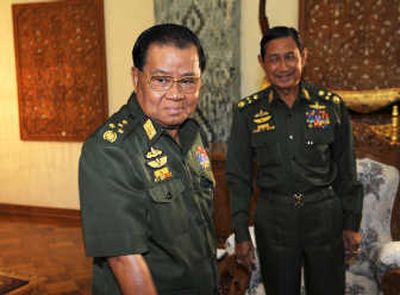Myanmar leaders agree to admit all foreign aid workers

BANGKOK – Myanmar’s powerful leader, Senior Gen. Than Shwe, agreed Friday to allow all foreign aid workers, regardless of nationality, to join relief efforts for survivors of Tropical Cyclone Nargis, U.N. Secretary-General Ban Ki-moon reported.
The concession, a potential turning point in getting help to victims of the devastating May 2-3 storm, came during a two-hour meeting between Ban and Than Shwe, head of the ruling military junta, in the isolated Myanmar capital, Naypyitaw.
There was no immediate confirmation from Myanmar authorities concerning the pledge.
The U.N. chief said the junta expressed willingness to let foreign civilian ships bring in aid but stood firm on its refusal to accept delivery from military vessels – the U.S. and French have naval ships in the region. That remains “a very sensitive issue,” said a senior U.N. official.
Foreign aid workers have slowly been arriving in Myanmar, also known as Burma, with more on the way – the Santa Monica, Calif.-based International Medical Corps said Friday it had received entry clearance for an initial four-member emergency response team. But most foreigners have been confined to Yangon, the country’s largest city. The United Nations hopes they now will be permitted to travel to the stricken Irrawaddy delta, the official said, speaking on the condition of anonymity.
“The general said he saw no reason why that should not happen – as long as they were genuine humanitarian workers and it was clear what they were going to be doing,” the official said. “We’ve got to turn that into the reality now.”
Than Shwe, wearing a military uniform and ribbons, conferred with Ban in an elaborate hall decorated with a painting of pagodas. The two men sat in large carved chairs, a bouquet of flowers between them.
The apparent opening for relief workers came two days before a donor conference in which the junta is expected to request support for what it said would be an $11 billion reconstruction program. Foreign officials have said donors are likely to be reluctant to commit funds until their relief experts are allowed to assess conditions in the disaster zone.
The conference this weekend is being convened in Yangon by the United Nations and the 10-member Association of Southeast Asian Nations.
Since Nargis struck three weeks ago, leaving at least 134,000 people dead or missing, U.N. agencies and international charities have struggled to mount a large-scale relief effort for the estimated 2.5 million destitute survivors. Their efforts have relied entirely on Myanmarese aid workers on the ground, as foreigners were largely excluded from the affected areas.
The generals’ apparent loosening on this point “is a significant step forward,” said Brian Agland, country director of the international charity CARE. However, he added, the pace of customs clearance for relief supplies should be accelerated.
A U.N. official urged caution, saying, “It would be prudent to wait and see what actually happens on the ground before drawing any firm conclusion about what this commitment represents.”